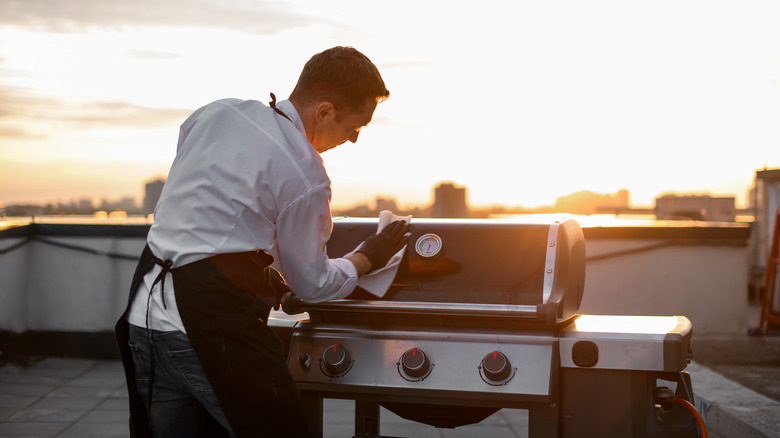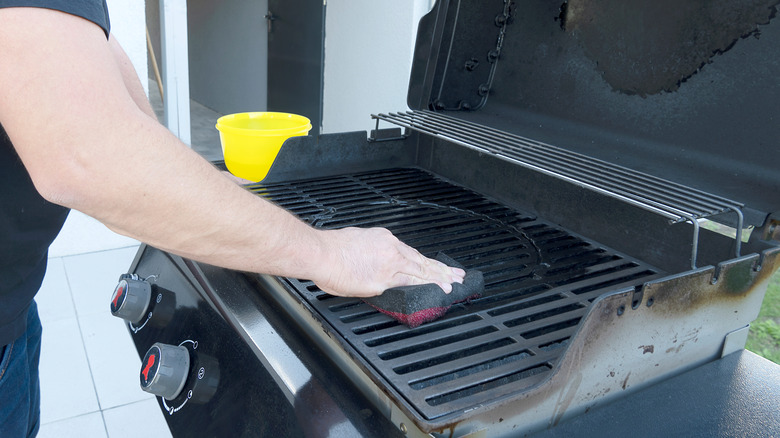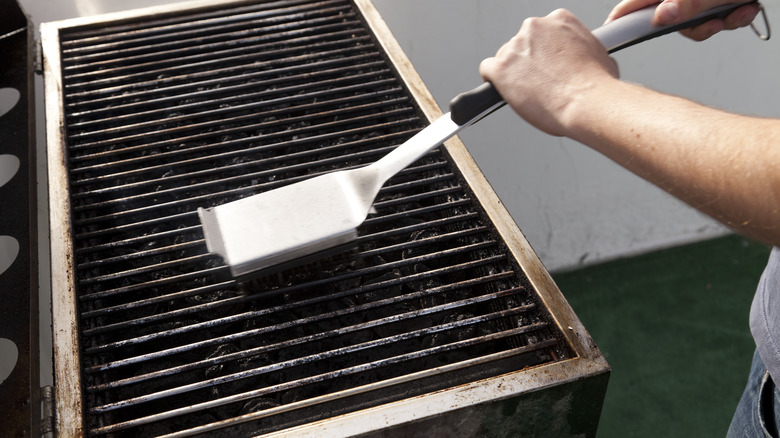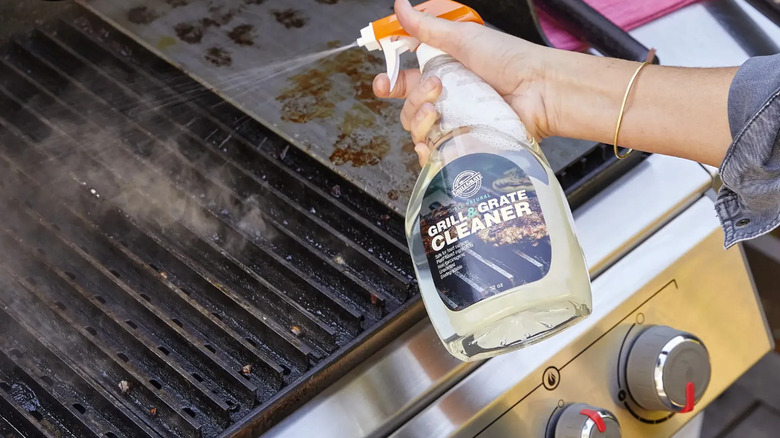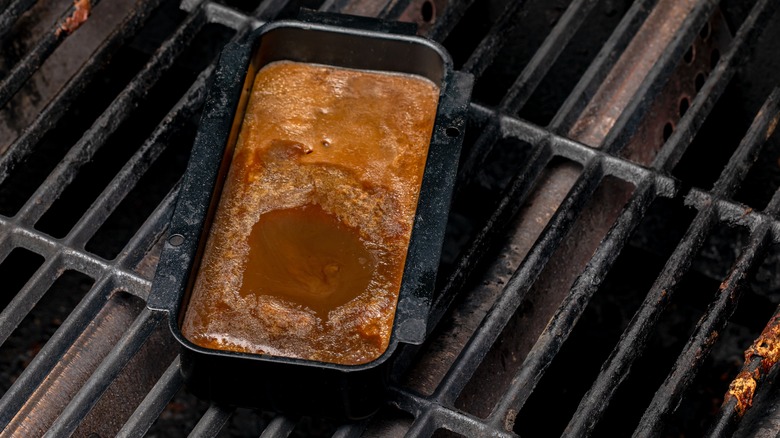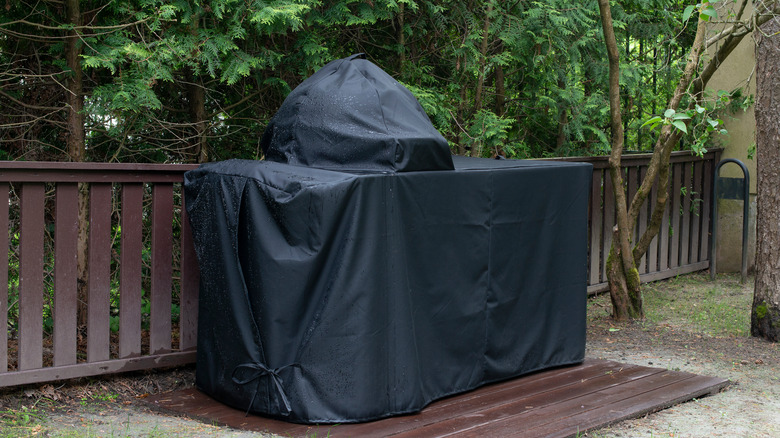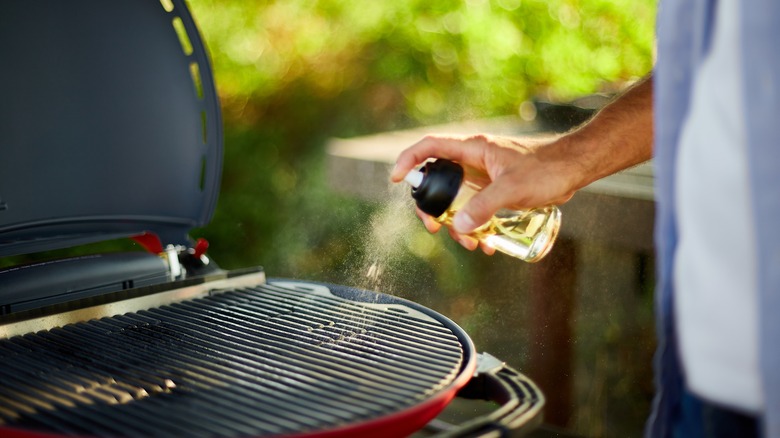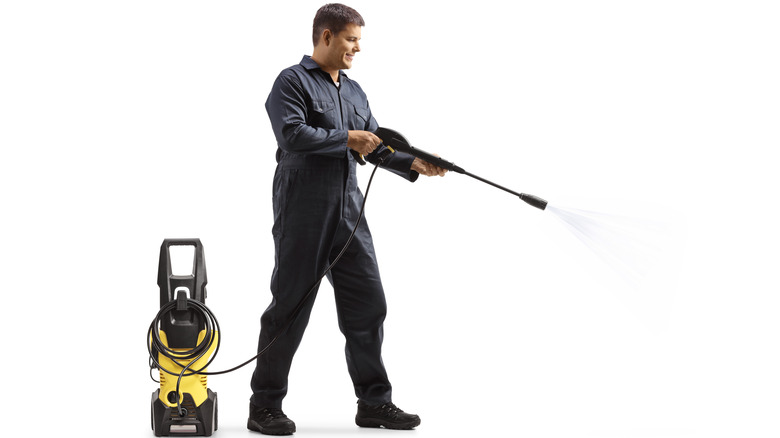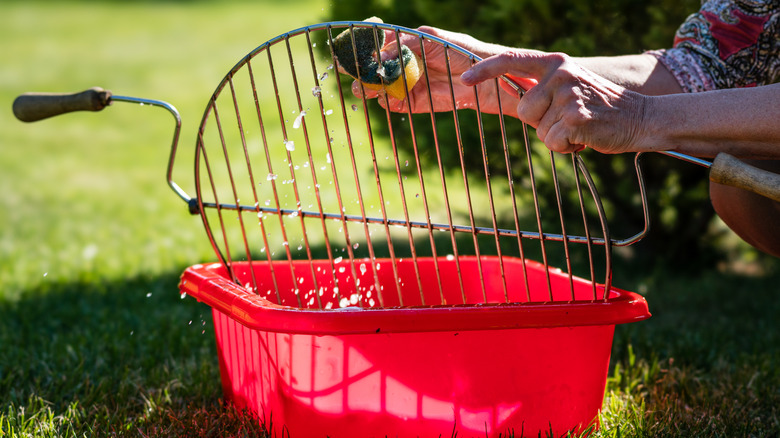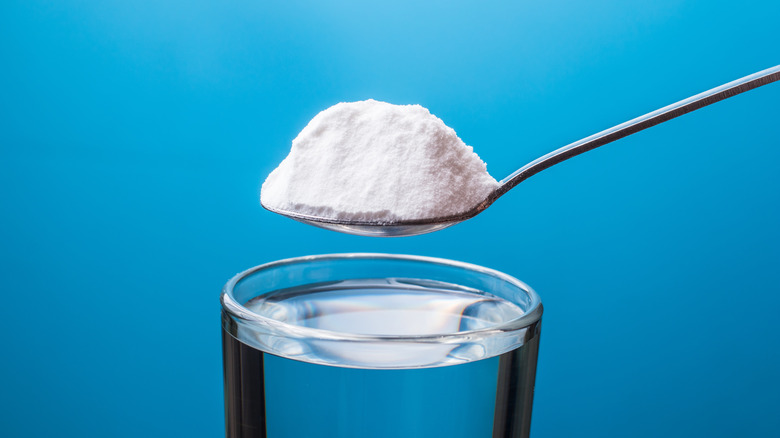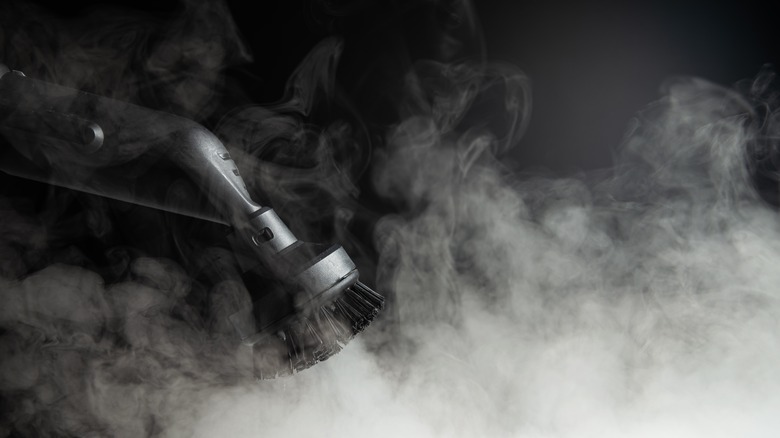11 Tips For Keeping Your Grill Shiny And Clean
Owning a grill is as much of a joy as it is a pain. We could think of a dozen items and kitchen utensils that are far more pleasant to clean than a greasy grill after a fun weekend, or worse — a grill that has been neglected to the point that even the thought of cleaning it makes you weak.
Luckily, modern cleaning tools and methods have revolutionized how we approach this task, making it far more efficient and less daunting than it may seem. Innovative brushes, environmentally-friendly cleaning solutions, and the smart use of everyday household items like baking soda or vinegar can turn a tedious chore into something manageable and, to some extent, satisfying.
No matter what type of grill you have, if you follow the tips we're about to share with you, chances are your grill will live a longer and more fruitful life, providing you with many sizzling meals for years to come.
1. Clean your grill after every use
One of the best and easiest ways to keep your grill in good shape is to clean it after every use. No matter how simple that sounds, we often drift into the habit of leaving it for the next time — well, who really wants to tackle the greasy mess after a grill party? Grills are challenging to clean, but it doesn't have to be if you make cleaning it regularly your new mantra.
This simple habit will not only make your cleaning chores much more manageable but will allow you to avoid bacterial buildup and potentially make you or one of your guests sick. Intuitively, leaving some residue on the grates might give it a better flavor, but that's something we'd not recommend experimenting with, mainly because the bacteria from raw meat are particularly dangerous. In 2013, Men's Health revealed that the average barbecue grill harbors 1.7 million microbes per square centimeter. That is 124% more bacteria than are lurking on your toilet seat!
Regular cleaning of your grill can also help increase its lifespan by preventing rust buildup on its parts. It's important to note that chromium used to make grill components requires oxygen to function, so cleaning off all food and grease after each use is absolutely essential.
2. Use professional grill cleaning tools
For those who can't go a week without the lingering aroma of a grilled burger, you're no stranger to the stubborn grease buildup that clings to your grill grates. Removing that gunk is crucial to ensuring your grill stays in top-notch condition.
The first indispensable tool in your cleaning arsenal should be a grill brush. The only thing to have in mind, though, is that not all grill brushes are created equal. Metal bristles on some can scratch your grill's surface or break off and contaminate your food. To avoid this, it's wise to choose a brush with natural bristles made from materials like bamboo or nylon. Of course, if you're dealing with a particularly stubborn grill that's seen better days, an abrasive metal brush may be your only option for bringing it back to life.
Another highly recommended tool for cleaning your grill grates is a grill brick. It's a small block of pumice stone that can tackle even the toughest grease and carbon buildup. The best part is that it's non-toxic, eco-friendly, and reusable. The fine grit of the grill brick makes it easy to dislodge grime without much effort. It can be used on any grill, whether gas, charcoal, electric, or ceramic. Unlike abrasive cleaners or scouring pads, the grill brick won't scratch or damage your grill, which makes it a must-have in your cleaning kit.
3. Use a degreaser on stubborn grease
Grease and oil can build up on the grill over time, causing it to look dirty, smell bad, and perform poorly. If you leave it for some time, using simple soap and a brush might not cut it; that's why we recommend using a professional degreaser to clean your grill regularly. A good degreaser is designed to dissolve grease and oil, making cleaning far less daunting.
Degreasers come in different forms, such as sprays, liquid concentrates, or wipes. Some brands make more environmentally-friendly degreasers that do a great job without all the nasty chemicals. They are usually biodegradable and odorless.
Before using the degreaser on your grill, it's essential to let it cool down completely. Once it has cooled, clear any stubborn food residue or ash from the grill grates and drip tray. Apply the degreaser using a sprayer to distribute it evenly across the grill surface, avoiding any electrical components or knobs. Allow the degreaser to work its magic by letting it sit for a few minutes. Then grab a brush or sponge and scrub vigorously to loosen any remaining fat. Finally, rinse the grill thoroughly with water and wipe it dry with a soft cloth.
4. Don't forget to empty the drip tray
The drip tray is a metal pan that sits underneath the grill grates and collects the grease, oil, and juices that drip from the food as it cooks. If you neglect to empty the drip pan after every use (and we know how tempting that is), you may face several problems that can affect your grilling experience and your grill's lifespan.
Firstly, a full drip pan can become a fire hazard. The accumulated fat can ignite when exposed to high heat, creating flames that may damage your grill and cause injuries. Grease and fat are among the leading factors in grill fires.
More so, if the grease and debris from the drip tray overflow and reach the burner tubes, they can clog them. This can affect your grill's heat distribution and temperature control, making grilling your steak tricky. To check if your grill is cooking evenly, try this genius bread hack for finding your grill's hot spots.
5. Invest in a grill cover
As a grill owner, you constantly face the challenge of maintaining a grill free from dirt or debris. Particularly if you need more space to throw it in a garage. Luckily, a grill cover is a simple yet effective solution to keep your grill's original color and shine.
Before anything else, the grill cover prevents your grill from getting wet. The damp grill will get rusty, making it unusable over time. Aside from rain or snow, think about how many random particles are floating in the air, from dust to leaves, pollen, and bird droppings, that can get into the cracks of your grill and clog the system entirely. The worst part is that you wouldn't necessarily know why your grill suddenly stopped working.
Depending on the climate zone in your area, the sun can be equally harmful to your grill. Covering it up will prevent your grill from fading or cracking due to exposure to UV rays or extreme temperatures. Unless you're crafty and can make it yourself, you should totally invest in a decent cover to match your grill — they aren't that expensive and will save you on costly repairs in the long run.
6. Season your grill
If you want to keep your grill in top condition, it's important to season it. This means coating the grates with oil and heating them up to create a non-stick surface. By doing this, you'll be able to prevent rust, corrosion, and harmful bacteria from developing on your grill. Plus, seasoning your grill makes cleaning easier after each use — all you need to do is brush off any leftover food.
To prepare your grill for its next use, you'll want to gather some cooking oil (vegetable, canola, or peanut oil with a high smoke point work best), a clean cloth, and a brush. For best results, preheat it to medium heat. Once it's hot, turn off the burners and disconnect the gas supply (if your grill has one).
Then, use a scraper or a grill brick to remove any ash from the grates. Apply a thin layer of oil to the grates using a cloth or brush. Turn the burners back on and let the grill heat up for another until the grates are dark in color. Once ready, let the grill cool completely before using it again or storing it away. Do this before each use for best results; otherwise, every few weeks should be enough.
7. Try using a pressure cleaner for deep cleaning your grill
A pressure cleaner is a device that uses a high-pressure water jet to remove dirt and grease from various surfaces. It saves you the hassle, as you don't have to worry about using brushes and sponges. Deep cleaning your grill with a pressure cleaner can take as little as 10 to 15 minutes compared to the hour or more you need to hand scrub and scrape it. Whether or not you need a degreaser will depend on the type of cleaner you have. Hot water pressure cleaners are usually more effective for removing grime and other stubborn stains, so they don't require additional chemicals, saving you extra bucks.
Depending on your budget, there are a number of options you could consider for your grill cleaning venture, like the more powerful cart pressure cleaners with wheels and handles that make them easy to move around or lightweight and portable hand-held pressure cleaners, which may have enough power to handle light grease build-up but not the grill has been neglected. For that, you would need to use something more heavy-duty. Remember to be extra careful when using a powerful pressure cleaner on weaker parts of your grill, as you could easily damage them.
8. Soak the grates in vinegar
Cleaning your grill grates can be a hassle, but vinegar can make it truly effortless. This natural cleaner is effective and affordable and can easily dissolve all kinds of dirt, grease, and food residue. In simple terms, acidity weakens the bond between these substances and your grill, making them easier to wipe away.
All you need is a bucket, vinegar, and a grill brush to try this. Any vinegar will work, but white vinegar is usually the most cost-effective and easiest to find. Simply fill your bucket with enough vinegar to cover the grates, then place the grates in the liquid and let them soak for at least 30 minutes or longer if they're really filthy.
Once the grates have soaked, remove them from the bucket and scrub them with a grill brush. You'll find that any food or grease comes off quickly and easily, leaving them looking shiny and new. Rinse the grates with water and dry them with a cloth before putting them back on your grill.
9. Make a baking soda paste
Baking soda is a natural wonder that can tackle any kind of grease and grime in your kitchen. And yes, it works marvels on your grill too. It's safe, eco-friendly, and cheap. You probably already have a box of baking soda in your pantry, so you don't need to buy any specialized cleaning products.
To make your own baking soda paste, you only need three parts of baking soda and one part of water. Mix them well in a bowl until you get a smooth and thick paste, then, spread it over the grates of your grill using a spatula or a cloth. Make sure you cover every inch of the grill that needs some attention.
Let the paste sit for 15 minutes to do its magic, then, grab a grill brush or a steel wool pad and scrub away the paste. You'll be amazed by how easily the grease and grime come off. Rinse all the parts with water and dry them with a towel. Trust us; your grill will look as good as new.
10. Use steam instead of chemical cleaners
Regardless of your grill type, steam cleaning can be a fantastic option when things get really filthy. When cleaning with steam, dirt and grease are loosened effortlessly without chemicals or detergents. This method also effectively kills harmful pathogens, making your grill food safe. Luckily you don't have to get an expensive and bulky commercial steam cleaner these days, as there are more practical alternatives.
A portable steam cleaner is a handy device that uses hot water and pressure to create steam to help loosen stubborn grease and food residue. It also comes with multiple attachments to help you cover every difficult-to-reach corner of your grill.
Another option to consider is a steam brush. This device has a built-in water reservoir and a heating element that produces steam, which you can then use to mist your grill grates. The brush's bristles help to scrub away any debris that's been loosened by the steam. However, keep in mind that while steam brushes are effective, they may not be able to reach every part of your grill.
11. Give your grill a deep clean every once in a while
Even if you clean your grill regularly, there comes a time when you need to roll up your sleeves and get into the nitty-gritty of it. This means dismantling the grill entirely and giving it a thorough deep clean. For simple charcoal grills, this usually involves scrubbing the grates and using steam to clean the exterior. However, if you have a more expensive grill with many parts and knobs, it may be a job that requires some mental preparation.
We recommend deep cleaning your grill at least once or twice a year, depending on how often you use it. Regardless of the technique and equipment you choose, the key is to meticulously go through every screw on the grill or, at the very least, to have a shot at it.
Grills are made from robust metal parts for a good reason — they can be restored quite well. Unless it's significantly rusty, you should be able to scrub and polish it to make it look as good as new. However, if you can't be bothered, there's an even better solution — you can always take your grill to be professionally cleaned for a thorough and hassle-free service.
